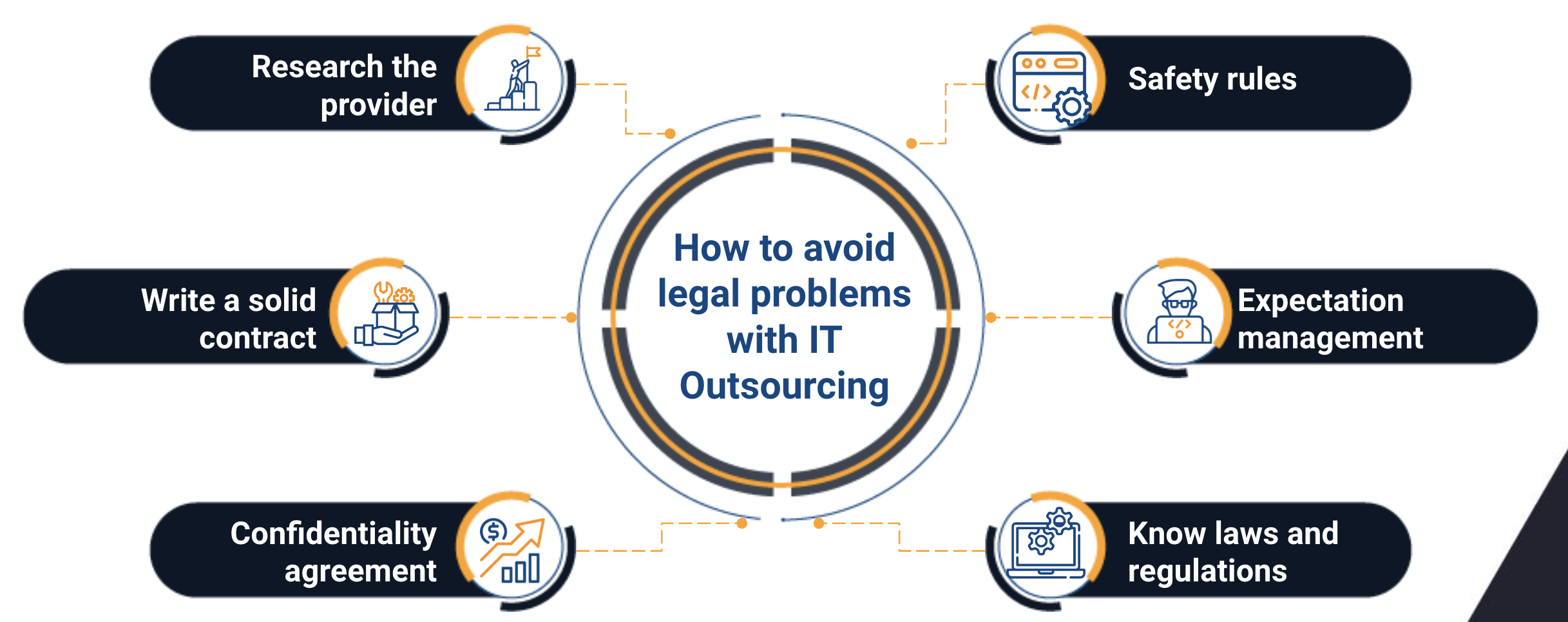
IT outsourcing is a common practice in the modern business world. It allows organizations to leverage the expertise and resources of third parties to meet their technology needs. However, this practice can also carry significant legal risks if not handled properly.
To avoid legal problems in IT outsourcing, it is essential to take a series of preventive measures and ensure that all relevant regulations and legal requirements are met. In this article, we will explain seven effective ways to avoid legal problems in IT outsourcing.

Strategies to avoid legal problems in IT outsourcing
1. Thoroughly research the IT outsourcing provider
The process of selecting an IT outsourcing service provider should begin with thorough research. Before signing any contract, it is crucial to carefully research and evaluate the proposed supplier. This involves reviewing your history, experience, references and financial capacity. Additionally, it is essential to verify that the provider complies with all regulations and licenses necessary to operate in your jurisdiction.
“An easy way to get reliable information about an IT outsourcing company is by checking their client reviews on Clutch, UpCity, and other trusted platforms. You can also consult the success stories that are published on the provider's website”, they explained in a Time Doctor article.
2. Write a solid contract
A well-drafted contract is the foundation of any successful outsourcing relationship. It must be clear and detailed regarding the services to be provided, the deadlines, the costs and the responsibilities of both parties.
It is also crucial to include clauses related to intellectual property, confidentiality and dispute resolution with the IT outsourcing provider. The assistance of an IT lawyer can be invaluable in this process to ensure that all legal aspects are properly addressed.

“It may seem obvious, but many outsourcing agreements are based on ambiguities and promises. And the current rush to close a deal is not helping,” they noted in an article in the business magazine CIO.
There should be a clear description of all the service that will be offered, deadlines, deliverables and team performance standards.
3. Establish data security standards
Data security is a critical concern in IT outsourcing, especially in an increasingly regulated world regarding data privacy. Make sure your contract includes clear provisions about how sensitive data will be protected and handled. Additionally, require regular security audits and verify that the provider complies with applicable data security standards and regulations, such as the General Data Protection Regulation (GDPR) in Europe.
4. Non-disclosure agreement (NDA)
“An important contract that is useful when it comes to the security of intellectual property and data is the NDA (non-disclosure agreement). There are countries where a confidentiality agreement is not considered authentic. Therefore, you should consider the laws regarding proprietary information in your offshoring country. In addition, it is necessary to take into account the information recovery laws of other countries in case of termination of the contract”, they explained in an article on LinkedIn.
5. Assess disaster recovery capacity
Disruption of IT outsourcing services can have a significant impact on your business. Therefore, it is essential that your IT service provider has a solid disaster recovery plan in place.
Verify that this plan is documented in the contract and is aligned with your needs and expectations. Additionally, conduct regular tests to ensure that the provider can effectively restore services in the event of a disaster.
6. Management of expectations and performance
Managing the relationship with your IT outsourcing service provider is crucial to avoid legal problems. Set clear expectations from the beginning and monitor performance regularly.
If the supplier does not meet agreed service levels, take immediate steps to remedy the situation. Keep detailed records of all communications and agreements, as these documents can be valuable in the event of legal disputes.

7. Stay up to date with laws and regulations
Laws and regulations in the field of technology and IT outsourcing are constantly evolving. To avoid legal problems, it is essential to stay informed about changes in legislation and ensure that your contract and practices are always up to date and in compliance with current laws. Ongoing legal advice can be essential to ensure compliance with changing regulations.
IT outsourcing can be an effective strategy for leveraging third-party expertise and resources, but it carries legal risks if not handled properly. By following these seven ways to avoid legal problems, you can protect your business and maintain a successful, legal complication-free relationship with your IT outsourcing provider. Investing time and resources in properly preparing and managing IT outsourcing can save you from costly litigation and data loss in the future.
Do you need a reliable IT outsourcing provider? At Rootstack, we have +12 years of experience supporting companies in their digital transformation. Contact us!

